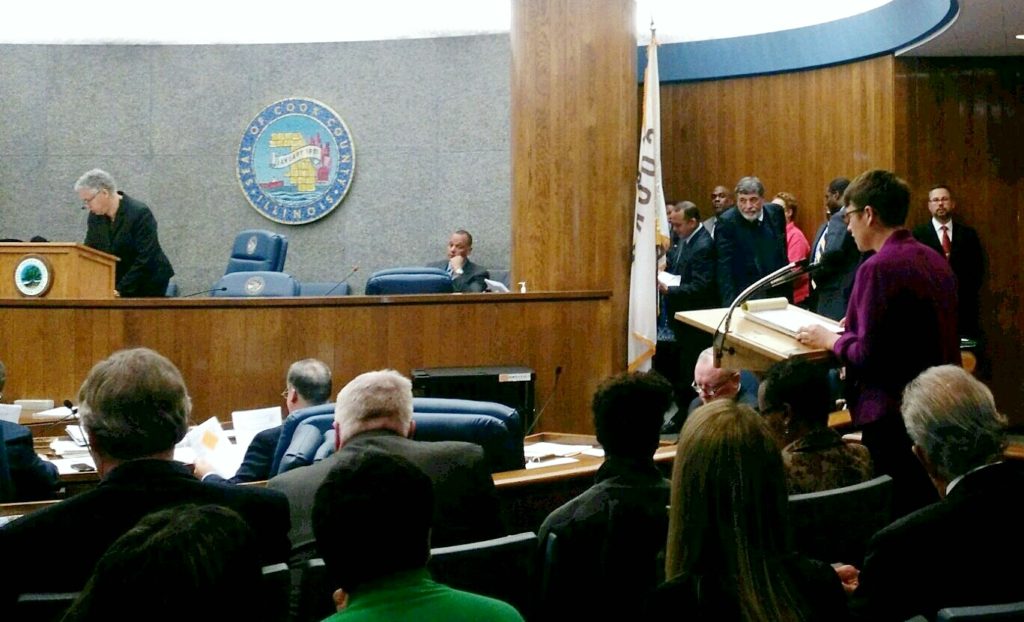Chicago Appleseed & Other Advocates Prevent Proposed Budget Item That Would Harm Families of People Accused of Crimes

On Tuesday, November 15th, the Cook County Board considered numerous amendments to the county budget, including several amendments designed to provide resources to the Cook County Public Defender’s (PD’s) Office. Prior to the proposed amendments, the PD’s office was allotted $2 million less than Cook County Public Defender Amy Campanelli requested. One combination of amendments sought to provide $1 million in funding to the Public Defender’s Office through increasing the amount of money taken from monetary bonds posted in criminal cases and collected by the county. Under Illinois state law, judges are allowed to order bond money collected by the Clerk of Court for the purposes of reimbursing the county for representation by the public defender or other court-appointed counsel. Proposed Amendment 17 suggested the county collect $1 million in these bond reimbursements, and proposed Amendment 18 used that revenue to fund 12 positions in the PD’s office.
The practice of reimbursing the county for indigent defense is already used in Cook County, but has a limited scope. Last year, approximately $60,000 was collected through bond reimbursements to the county—not enough to pay even one assistant public defender’s salary. The proposed $1 million dollar budget item would represent a huge expansion of an already undesirable policy and create an incentive for judges to take bond money from indigent defendants. Chicago Appleseed and the Chicago Council of Lawyers spoke at yesterday’s budget hearing in opposition to proposed Amendment 17. Also speaking out against the practicing of taking bond money to reimburse the county were representatives from Chicago Community Bond Fund and Target Area Development Corporation, and Cook County Public Defender Amy Campanelli.
Each speaker emphasized the hardships that many families go through to post bond in the first place and the negative impact that losing bond or choosing to leave a loved one locked up has on defendants and their families. By definition, clients of the public defender are too poor to afford to pay for a private attorney and thus constitutionally entitled to a state-provided attorney. Chicago Appleseed emphasized the possible violation of the Sixth Amendment right to counsel raised by forcing impoverished people to pay for their defense and the corresponding necessity of funding indigent defense through equitable and fair means. Max Suchan of the Chicago Community Bond Fund shared stories of family members selling their only family car or taking a second job at a Dairy Queen to try and raise bond money. All three speakers cited the fundamental unfairness of monetary bond and ongoing efforts to eliminate monetary bond entirely. The issues raised in our collective testimonies were cited by several Commissioners in their decisions to reject the proposed amendment, and we are confident that the vote would not have come out the same way without our participation. Amy Campanelli emphasized to the board that while it is crucial her office be fully funded, the PD’s office simply could not appropriately be “funded on the backs of Cook County’s poorest and most vulnerable communities.”
Ultimately, proposed amendment 17 was defeated by a vote of 12 to 2, with one Commissioner voting present and several absent from the vote. With this victory, we hope the Cook County Board will pursue other, more equitable means of ensuring fully funded, high quality public defense in Cook County. You can read our complete testimony below.
—-
Good morning. My name is Sharlyn Grace, and I am a Criminal Justice Policy Analyst at Chicago Appleseed Fund for Justice. I am here this morning to speak in opposition to proposed Amendment 17 of the President’s Executive Budget Recommendation.
Chicago Appleseed and our partner organization the Chicago Council of Lawyers have a long history of working for fair courts and have been involved in criminal justice reform for many years. An essential component of access to justice is ensuring the Cook County public defender’s office is fully funded. However, we have several concerns about proposed Amendment 17.
- First, this approach to funding the Public Defender’s Office likely violates the Constitution. Forcing an indigent defendant to essentially pay for a public defense violates the Sixth Amendment’s right to an attorney. There is also a constitutional challenge to monetary bond pending right now in Cook County. Connecting the public defender’s budget to the posting of bond creates further reliance on an unfair and likely illegal system.
- Second, the money to post bond is usually provided by relatives of defendants; it is often borrowed from others or even procured by taking out loans. There is a long tradition of bond money being returned to the party paying the funds. Decreasing the likelihood that bond money is returned will result in fewer people being bonded out, which will cause the county to spend more money incarcerating people in the Jail. Proposed Amendment 17 suggests we use the resources posted by our county’s most vulnerable communities to fund essential government services. This is bad public policy that will harm not just individual families, but entire communities who are disproportionately impacted by the criminal justice system—particularly African American communities. These are the communities that can least afford to shoulder the costs of our necessary and constitutionally required government services.
- Finally, the proposed amendment would cause these significant harms to families and communities, including likely constitutional violations, while doing little to fill the very real need for a fully funded public defender’s office. With only approximately $60,000 collected last year, bond money cannot and should not fill the $2 million dollar shortfall in the Public Defender’s Office budget. That must be addressed through other, more equitable sources.
Chicago Appleseed and the Chicago Council of Lawyers urge you to vote against proposed Amendment 17. Thank you for your time and the opportunity to speak today.
